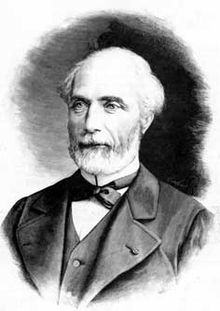Charles de Freycinet
|
Charles de Freycinet OLH |
|
|---|---|
 |
|
| Member of the Académie française | |
|
In office 11 December 1890 – 14 May 1923 |
|
| Preceded by | Émile Augier |
| Succeeded by | Émile Picard |
| Minister of War | |
|
In office 1 November 1898 – 18 February 1899 |
|
| Prime Minister | Charles Dupuy |
| Preceded by | Charles Chanoine |
| Succeeded by | Camille Krantz |
|
In office 3 April 1888 – 10 January 1893 |
|
| Prime Minister |
Charles Floquet Pierre Tirard Himself Émile Loubet Alexandre Ribot |
| Preceded by | François Logerot |
| Succeeded by | Julien Loizillon |
| 35th Prime Minister of France | |
|
In office 17 March 1890 – 27 February 1892 |
|
| President | Marie François Sadi Carnot |
| Preceded by | Pierre Tirard |
| Succeeded by | Émile Loubet |
|
In office 7 January 1886 – 16 December 1886 |
|
| President | Jules Grévy |
| Preceded by | Henri Brisson |
| Succeeded by | René Goblet |
|
In office 30 January 1882 – 7 August 1882 |
|
| President | Jules Grévy |
| Preceded by | Léon Gambetta |
| Succeeded by | Charles Duclerc |
|
In office 28 December 1879 – 23 September 1880 |
|
| President | Jules Grévy |
| Preceded by | William Waddington |
| Succeeded by | Jules Ferry |
| Minister of Foreign Affairs | |
|
In office 28 December 1879 – 3 December 1886 |
|
| Prime Minister | Himself Henri Brisson |
| Preceded by | Paul-Armand Challemel-Lacour |
| Succeeded by | Émile Flourens |
| Minister of Public Works | |
| Prime Minister |
Jules Dufaure William Waddington |
| Preceded by | Michel Graeff |
| Succeeded by | Henri Varroy |
|
Member of the French Senate for Seine |
|
|
In office 30 January 1876 – 11 January 1920 |
|
| Succeeded by | Louis Dausset |
| Personal details | |
| Born |
14 November 1828 Foix, Ariège, France |
| Died | 14 May 1923 (aged 94) Paris, France |
| Political party |
Republican Union (1871–1885) Union of the Lefts (1885–1894) League of Patriots (1894–1923) |
| Spouse(s) | Jeanne Alexandrine Bosc (m. 1858; d. 1923) |
| Education | École Polytechnique |
| Profession | Engineer |
| Religion | Calvinism |
Charles Louis de Saulces de Freycinet (French: [ʃaʁl də fʁɛjsinɛ]; 14 November 1828 – 14 May 1923) was a French statesman and four times Prime Minister during the Third Republic. He also served an important term as Minister of War (1888–93). He belonged to the Opportunist Republicans faction.
He was elected a member of the Academy of Sciences, and in 1890, the fourteenth member to occupy a seat in the Académie française.
Freycinet was born at Foix (Ariège) of a Protestant family and was the nephew of Louis de Freycinet, a French navigator. Charles Freycinet was educated at the École Polytechnique. He entered government service as a mining engineer (see X-Mines). In 1858 he was appointed traffic manager to the Compagnie de chemins de fer du Midi, a post in which he showed a remarkable talent for organization, and in 1862 returned to the engineering service, attaining in 1886 the rank of inspector-general. He was sent on several special scientific missions, including one to the UK, on which he wrote a notable Mémoire sur le travail des femmes et des enfants dans les manufactures de l'Angleterre (1867).
On the establishment of the Third Republic in September 1870, he offered his services to Léon Gambetta, was appointed prefect of the department of Tarn-et-Garonne, and in October became chief of the military cabinet. It was mainly Freycinet's powers of organization which enabled Gambetta to raise army after army to oppose the invading Germans. He revealed himself to be a competent strategist, but the policy of dictating operations to the generals in the field was not attended with happy results. The friction between him and General d'Aurelle de Paladines resulted in the loss of the advantage temporarily gained at Orleans, and he was responsible for the campaign in the east, which ended in the destruction of the army of Charles Denis Bourbaki.
...
Wikipedia
